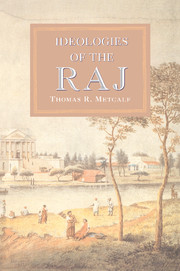1 - Introduction: Britain and India in the eighteenth century
Published online by Cambridge University Press: 28 March 2008
Summary
As they extended their rule across the face of India during the late eighteenth and early nineteenth centuries, the British had to confront the problem of how to govern this far-flung dependency, and, more importantly, how to justify this governance to themselves. How could the British, as a members of a society who adopted as their own the ideals of nationalism, in good conscience extend their authority over this distant and densely peopled land? There was, to be sure, agreement, after the rapacious years of conquest following Plassey, that, as Edmund Burke reiterated, Britain must secure the ‘prosperity’ of India’s people before seeking any gain itself. Britain’s right to rule India, so its leaders argued, could be made legitimate, but only through just governance. Yet such a principle by itself gave little guidance for a fledgling empire. How was such a governance to be secured, and what principles might give the English a claim upon such legitimacy?
This introductory chapter examines the intellectual foundations upon which, during the eighteenth century, the British constructed their rule in India. Of necessity, as they sought to come to terms with the existence of their new dominion, the British drew upon a range of ideas that had for a long time shaped their views of themselves and, more generally, of the world outside their island home. As products at once of Britain’s own history of overseas expansion and its participation in the larger intellectual currents of Europe, these ideas included settled expectations of how a ‘proper’ society ought to be organized, and the values, above all those of the right to property and the rule of law, that for the English defined a ‘civilized’ people.
- Type
- Chapter
- Information
- Ideologies of the Raj , pp. 1 - 27Publisher: Cambridge University PressPrint publication year: 1995



